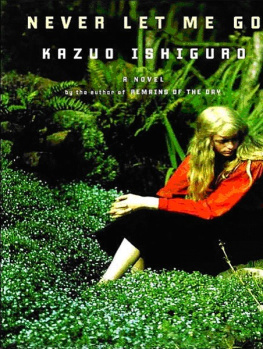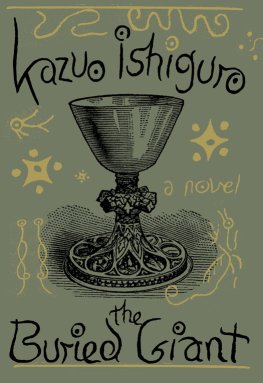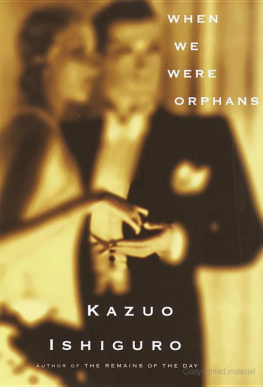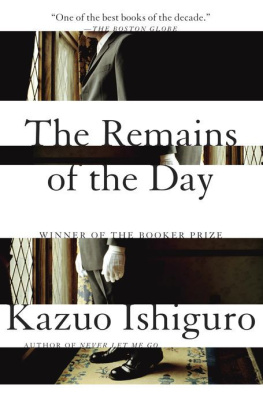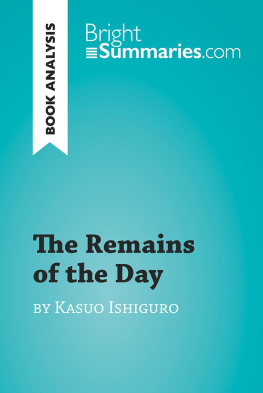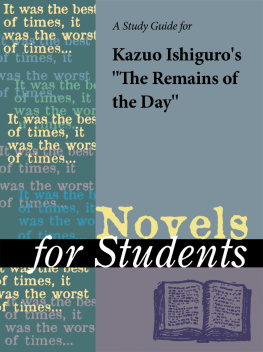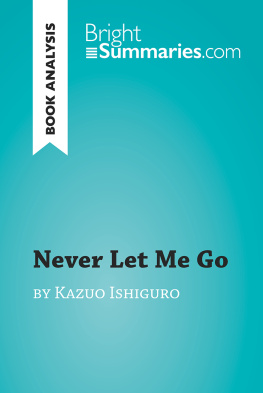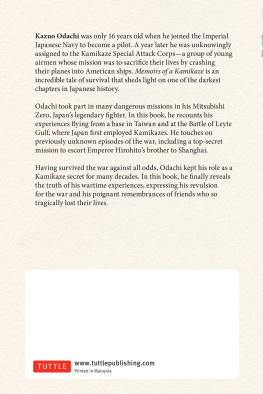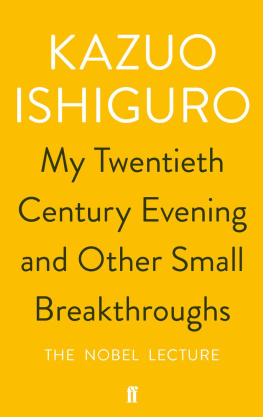Kazuo Ishiguro - Never Let Me Go
Here you can read online Kazuo Ishiguro - Never Let Me Go full text of the book (entire story) in english for free. Download pdf and epub, get meaning, cover and reviews about this ebook. year: 2005, publisher: Knopf Doubleday Publishing Group, genre: Romance novel. Description of the work, (preface) as well as reviews are available. Best literature library LitArk.com created for fans of good reading and offers a wide selection of genres:
Romance novel
Science fiction
Adventure
Detective
Science
History
Home and family
Prose
Art
Politics
Computer
Non-fiction
Religion
Business
Children
Humor
Choose a favorite category and find really read worthwhile books. Enjoy immersion in the world of imagination, feel the emotions of the characters or learn something new for yourself, make an fascinating discovery.
- Book:Never Let Me Go
- Author:
- Publisher:Knopf Doubleday Publishing Group
- Genre:
- Year:2005
- Rating:3 / 5
- Favourites:Add to favourites
- Your mark:
- 60
- 1
- 2
- 3
- 4
- 5
Never Let Me Go: summary, description and annotation
We offer to read an annotation, description, summary or preface (depends on what the author of the book "Never Let Me Go" wrote himself). If you haven't found the necessary information about the book — write in the comments, we will try to find it.
Never Let Me Go — read online for free the complete book (whole text) full work
Below is the text of the book, divided by pages. System saving the place of the last page read, allows you to conveniently read the book "Never Let Me Go" online for free, without having to search again every time where you left off. Put a bookmark, and you can go to the page where you finished reading at any time.
Font size:
Interval:
Bookmark:
Knopf Doubleday Publishing Group
* ISBN-13: 9781400044832
* ISBN: 1400044839
To Lorna and Naomi
Myname is Kathy H. Im thirty-one years old, and Ive been a carer nowfor over eleven years. That sounds long enough, I know, but actuallythey want me to go on for another eight months, until the end of thisyear. Thatll make it almost exactly twelve years. Now I know my beinga carer so long isnt necessarily because they think Im fantastic atwhat I do. There are some really good carers whove been told to stopafter just two or three years. And I can think of one carer at leastwho went on for all of fourteen years despite being a complete waste ofspace. So Im not trying to boast. But then I do know for a facttheyve been pleased with my work, and by and large, I have too. Mydonors have always tended to do much better than expected. Theirrecovery times have been impressive, and hardly any of them have beenclassified as agitated, even before fourth donation. Okay, maybe I am boasting now. But it means a lot to me, being able to do my work well,especially that bit about my donors staying calm. Ive developed akind of instinct around donors. I know when to hang around and comfortthem, when to leave them to themselves; when to listen to everythingthey have to say, and when just to shrug and tell them to snap out ofit.
Anyway,Im not making any big claims for myself. I know carers, working now,who are just as good and dont get half the credit. If youre one ofthem, I can understand how you might get resentfulabout my bedsit, mycar, above all, the way I get to pick and choose who I look after. AndIm a Hailsham studentwhich is enough by itself sometimes to getpeoples backs up. Kathy H., they say, she gets to pick and choose, andshe always chooses her own kind: people from Hailsham, or one of theother privileged estates. No wonder she has a great record. Ive heardit said enough, so Im sure youve heard it plenty more, and maybetheres something in it. But Im not the first to be allowed to pickand choose, and I doubt if Ill be the last. And anyway, Ive done myshare of looking after donors brought up in every kind of place. By thetime I finish, remember, Ill have done twelve years of this, and itsonly for the last six theyve let me choose.
Andwhy shouldnt they? Carers arent machines. You try and do your bestfor every donor, but in the end, it wears you down. You dont haveunlimited patience and energy. So when you get a chance to choose, ofcourse, you choose your own kind. Thats natural. Theres no way Icould have gone on for as long as I have if Id stopped feeling for mydonors every step of the way. And anyway, if Id never startedchoosing, how would I ever have got close again to Ruth and Tommy afterall those years?
Butthese days, of course, there are fewer and fewer donors left who Iremember, and so in practice, I havent been choosing that much. As Isay, the work gets a lot harder when you dont have that deeper linkwith the donor, and though Ill miss being a carer, it feels just aboutright to be finishing at last come the end of the year.
Ruth,incidentally, was only the third or fourth donor I got to choose. Shealready had a carer assigned to her at the time, and I remember ittaking a bit of nerve on my part. But in the end I managed it, and theinstant I saw her again, at that recovery centre in Dover, all ourdifferenceswhile they didnt exactly vanishseemed not nearly asimportant as all the other things: like the fact that wed grown uptogether at Hailsham, the fact that we knew and remembered things noone else did. Its ever since then, I suppose, I started seeking outfor my donors people from the past, and whenever I could, people fromHailsham.
Therehave been times over the years when Ive tried to leave Hailshambehind, when Ive told myself I shouldnt look back so much. But thenthere came a point when I just stopped resisting. It had to do withthis particular donor I had once, in my third year as a carer; it washis reaction when I mentioned I was from Hailsham. Hed just comethrough his third donation, it hadnt gone well, and he must have knownhe wasnt going to make it. He could hardly breathe, but he lookedtowards me and said: Hailsham. I bet that was a beautiful place. Thenthe next morning, when I was making conversation to keep his mind offit all, and I asked where hed grown up, he mentioned some place in Dorset and his face beneath the blotcheswent into a completely new kind of grimace. And I realised then howdesperately he didnt want reminded. Instead, he wanted to hear aboutHailsham.
Soover the next five or six days, I told him whatever he wanted to know,and hed lie there, all hooked up, a gentle smile breaking through.Hed ask me about the big things and the little things. About ourguardians, about how we each had our own collection chests under ourbeds, the football, the rounders, the little path that took you allround the outside of the main house, round all its nooks and crannies,the duck pond, the food, the view from the Art Room over the fields ona foggy morning. Sometimes hed make me say things over and over;things Id told him only the day before, hed ask about like Id nevertold him. Did you have a sports pavilion? Which guardian was yourspecial favourite? At first I thought this was just the drugs, butthen I realised his mind was clear enough. What he wanted was not justto hear about Hailsham, but to remember Hailsham ,just like it had been his own childhood. He knew he was close tocompleting and so thats what he was doing: getting me to describethings to him, so theyd really sink in, so that maybe during thosesleepless nights, with the drugs and the pain and the exhaustion, theline would blur between what were my memories and what were his. Thatwas when I first understood, really understood, just how lucky wedbeenTommy, Ruth, me, all the rest of us.

Drivingaround the country now, I still see things that will remind me ofHailsham. I might pass the corner of a misty field, or see part of alarge house in the distance as I come down the side of a valley, even aparticular arrangement of poplar trees up on a hillside, and Illthink: Maybe thats it! Ive found it! This actually is Hailsham !Then I see its impossible and I go on driving, my thoughts drifting onelsewhere. In particular, there are those pavilions. I spot them allover the country, standing on the far side of playing fields, littlewhite prefab buildings with a row of windows unnaturally high up,tucked almost under the eaves. I think they built a whole lot like thatin the fifties and sixties, which is probably when ours was put up. IfI drive past one I keep looking over to it for as long as possible, andone day Ill crash the car like that, but I keep doing it. Not long agoI was driving through an empty stretch of Worcestershire and saw onebeside a cricket ground so like ours at Hailsham I actually turned thecar and went back for a second look.
Weloved our sports pavilion, maybe because it reminded us of those sweetlittle cottages people always had in picture books when we were young.I can remember us back in the Juniors , pleading withguardians to hold the next lesson in the pavilion instead of the usualroom. Then by the time we were in Senior 2when we were twelve, goingon thirteenthe pavilion had become the place to hide out with yourbest friends when you wanted to get away from the rest of Hailsham.
Thepavilion was big enough to take two separate groups without thembothering each otherin the summer, a third group could hang about outon the veranda. But ideally you and your friends wanted the place justto yourselves, so there was often jockeying and arguing. The guardianswere always telling us to be civilised about it, but in practice, youneeded to have some strong personalities in your group to stand achance of getting the pavilion during a break or free period. I wasntexactly the wilting type myself, but I suppose it was really because ofRuth we got in there as often as we did.
Font size:
Interval:
Bookmark:
Similar books «Never Let Me Go»
Look at similar books to Never Let Me Go. We have selected literature similar in name and meaning in the hope of providing readers with more options to find new, interesting, not yet read works.
Discussion, reviews of the book Never Let Me Go and just readers' own opinions. Leave your comments, write what you think about the work, its meaning or the main characters. Specify what exactly you liked and what you didn't like, and why you think so.

